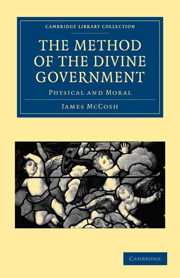Book contents
- Frontmatter
- Contents
- PREFACE TO FIRST EDITION
- PREFACE TO SECOND EDITION
- BOOK FIRST GENERAL VIEW OF THE DIVINE GOVERNMENT AS FITTED TO THROW LIGHT ON THE CHARACTER OF GOD
- BOOK SECOND PARTICULAR INQUIRY INTO THE METHOD OF THE DIVINE GOVERNMENT IN THE PHYSICAL WORLD
- BOOK THIRD PARTICULAR INQUIRY INTO THE PRINCIPLES OF THE HUMAN MIND THROUGH WHICH GOD GOVERNS MANKIND
- CHAPTER I MAN's ORIGINAL AND INDESTRUCTIBLE MORAL NATURE
- CHAPTER II ACTUAL MORAL STATE OF MAN
- CHAPTER III OTHER GOVERNING PRINCIPLES OF THE HUMAN MIND
- BOOK FOURTH RESULTS—THE RECONCILIATION OF GOD AND MAN
- APPENDIX ON FUNDAMENTAL PRINCIPLES
- REFERENCES TO AUTHORS AND SYSTEMS
CHAPTER I - MAN's ORIGINAL AND INDESTRUCTIBLE MORAL NATURE
Published online by Cambridge University Press: 29 August 2010
- Frontmatter
- Contents
- PREFACE TO FIRST EDITION
- PREFACE TO SECOND EDITION
- BOOK FIRST GENERAL VIEW OF THE DIVINE GOVERNMENT AS FITTED TO THROW LIGHT ON THE CHARACTER OF GOD
- BOOK SECOND PARTICULAR INQUIRY INTO THE METHOD OF THE DIVINE GOVERNMENT IN THE PHYSICAL WORLD
- BOOK THIRD PARTICULAR INQUIRY INTO THE PRINCIPLES OF THE HUMAN MIND THROUGH WHICH GOD GOVERNS MANKIND
- CHAPTER I MAN's ORIGINAL AND INDESTRUCTIBLE MORAL NATURE
- CHAPTER II ACTUAL MORAL STATE OF MAN
- CHAPTER III OTHER GOVERNING PRINCIPLES OF THE HUMAN MIND
- BOOK FOURTH RESULTS—THE RECONCILIATION OF GOD AND MAN
- APPENDIX ON FUNDAMENTAL PRINCIPLES
- REFERENCES TO AUTHORS AND SYSTEMS
Summary
SECT. I.—THE WILL OR THE OPTATIVE FACULTY.—CONDITIONS OP RESPONSIBILITY.
On taking a survey of the human soul, with the view of discovering its attributes, we are struck first of all with certain faculties which enable us to form an apprehension or conception of existing things, material and mental. They may be called the faculties of—
SIMPLE APPREHENSION OR CONCEPTION.
They are such as these—(1.) Perception, which gives us the knowledge of material objects. (2.) Consciousness, or internal perception, called also by Locke, reflection, which gives us the knowledge of mental states. (3.) Memory, or the reproductive faculty, which recalls both of the above.
In the exercise of the first of these, we conceive of objects as existing in space. In the exercise of the third, we conceive of them as occupying time. The first of these gives us the external world, and the second the internal world; and by the three we have the rude materials of all our knowledge.
II. There are the powers of imagination, by which we conceive of mental and material objects in new and non-existing forms, and that either by increase or decrease.
Above these simple faculties we have—
III. The Reason, discovering the relations of things, and determining the true and the false; and—
IV. The Moral Faculty, determining the morally right and wrong.
Intimately connected with these faculties we have—
V. The Emotions, or the sensibility, lively or dull, pleasurable or painful, attached to our mental states.
VI. The Will, or optative power, fixing among the objects presented to the mind on certain ones as to be chosen.
- Type
- Chapter
- Information
- The Method of the Divine GovernmentPhysical and Moral, pp. 270 - 333Publisher: Cambridge University PressPrint publication year: 2009First published in: 1850



